The Summer of ’67 was a unique time in America’s history that some fondly remember as a season full of love, music and flower power. Still, for others in major American cities, that summer was awash in civil unrest, where waves of injustice led to rebellion and social change. A new film directed by Kathryn Bigelow and starring John Boyega, Anthony Mackie, Will Poulter and Algee Smith re-enacts the 1967 incident at Algiers Motel in Detroit that left three young men dead. This event marked a turning point in the civil rights movement when lost innocence gave way to a revolution now undeterred by fear. The youth of the day had seen the worst and they were ready to fight so in the future these things would be only recalled in history books.
Unfortunately, we are reminded, daily, that little has changed since then and while there has been progress over the last 50 years, the incidents at Algiers Motel and in the City of Detroit can occur at any time, in any city and people are still rebelling and fighting for justice when it does. For many seeing Detroit in theaters this weekend, this will be their first time hearing of these events. For others, it will be like reliving that time all over again. Whether you are new to this history or can remember where you were when the Detroit crisis began in the summer of 1967, these 13 must-read summer books will give you a better understanding of what really happened there and set up a clear context for viewing the film afterward.
Intersection: What Detroit has Gained, and Lost, 50 years after the Uprisings of 1967 (2017) by Bridge Magazine and Detroit Journalism Collective
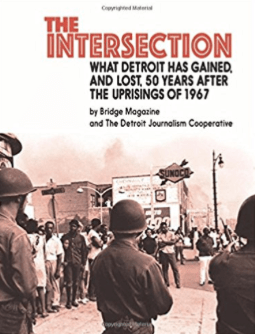 In the Foreword, Pulitzer Prize-winning, Detroit native Stephen Henderson writes: “Fifty years after anger and frustration over police-community relations boiled over into a rebellion in Detroit, there are lots of people asking what we’ve learned, how we’ve changed…If there is good news, 50 years after the 1967 uprising, it is probably that we are all much more honest about the ways in which the problems of then still haunt us now. There’s nowhere near as much gloss or self-kidding as we used to indulge. This book, a collection of the coverage by the Detroit Journalism Cooperative during 2016, is a testament to that.”
In the Foreword, Pulitzer Prize-winning, Detroit native Stephen Henderson writes: “Fifty years after anger and frustration over police-community relations boiled over into a rebellion in Detroit, there are lots of people asking what we’ve learned, how we’ve changed…If there is good news, 50 years after the 1967 uprising, it is probably that we are all much more honest about the ways in which the problems of then still haunt us now. There’s nowhere near as much gloss or self-kidding as we used to indulge. This book, a collection of the coverage by the Detroit Journalism Cooperative during 2016, is a testament to that.”
Intersection examines a critical time in Detroit’s history. Overflowing with information and historical analysis, Intersection offers readers an understanding of the past and how it contributes to modern-day rebellion. This collection is complete with archival photos, contemporary photos, graphs and timelines, showcasing the story of the 1967 uprisings from a journalist’s point of view.
The Detroit Riot of 1967 (2017)
by Hubert G. Locke
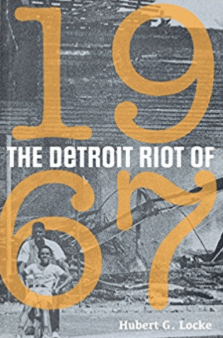 Now for the first time in paperback and with a new reflective essay that examines the events a half-century later, The Detroit Riot of 1967 (originally published in 1969) is the story of that terrible experience as told from the perspective of Hubert G. Locke, then administrative aide to Detroit’s police commissioner. The book covers the week between the riot’s outbreak and the aftermath thereof. An hour-by-hour account is given of the looting, arson, and sniping, as well as the problems faced by the police, National Guard, and federal troops who struggled to restore order. Locke goes on to address the situation as outlined by the courts, and the response of the community-including the media, social and religious agencies, and civic and political leadership. Finally, Locke looks at the attempt of white leadership to forge a new alliance with a rising, militant black population; the shifts in political perspectives within the black community itself; and the growing polarization of black and white sentiment in a city that had previously received national recognition as a “model community in race relations.”
Now for the first time in paperback and with a new reflective essay that examines the events a half-century later, The Detroit Riot of 1967 (originally published in 1969) is the story of that terrible experience as told from the perspective of Hubert G. Locke, then administrative aide to Detroit’s police commissioner. The book covers the week between the riot’s outbreak and the aftermath thereof. An hour-by-hour account is given of the looting, arson, and sniping, as well as the problems faced by the police, National Guard, and federal troops who struggled to restore order. Locke goes on to address the situation as outlined by the courts, and the response of the community-including the media, social and religious agencies, and civic and political leadership. Finally, Locke looks at the attempt of white leadership to forge a new alliance with a rising, militant black population; the shifts in political perspectives within the black community itself; and the growing polarization of black and white sentiment in a city that had previously received national recognition as a “model community in race relations.”
Detroit 1967: Origins, Impacts, Legacies (2017) by Joel Stone, Editor
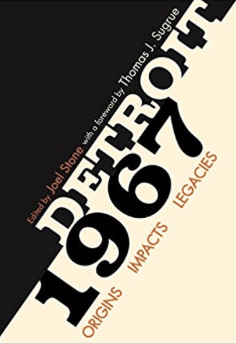 In the summer of 1967, Detroit experienced one of the worst racially charged civil disturbances in United States history. Years of frustration generated by entrenched and institutionalized racism boiled over late on a hot July night. In an event that has been called a “riot,” “rebellion,” “uprising,” and “insurrection,” thousands of African Americans took to the street for several days of looting, arson, and gunfire. Law enforcement was overwhelmed, and it wasn’t until battle-tested federal troops arrived that the city returned to some semblance of normalcy. Fifty years later, native Detroiters cite this event as pivotal in the city’s history, yet few completely understand what happened, why it happened, or how it continues to affect the city today. Discussions of the events are often rife with misinformation and myths, and seldom take place across racial lines. It is editor Joel Stone’s intention with Detroit 1967: Origins, Impacts, Legacies to draw memories, facts, and analysis together to create a broader context for these conversations. Detroit 1967 aims to correct fallacies surrounding the events that took place and led up to the summer of 1967 in Detroit, and to encourage informed discussion around this topic. Readers of Detroit history and urban studies will be drawn to and enlightened by these powerful essays.
In the summer of 1967, Detroit experienced one of the worst racially charged civil disturbances in United States history. Years of frustration generated by entrenched and institutionalized racism boiled over late on a hot July night. In an event that has been called a “riot,” “rebellion,” “uprising,” and “insurrection,” thousands of African Americans took to the street for several days of looting, arson, and gunfire. Law enforcement was overwhelmed, and it wasn’t until battle-tested federal troops arrived that the city returned to some semblance of normalcy. Fifty years later, native Detroiters cite this event as pivotal in the city’s history, yet few completely understand what happened, why it happened, or how it continues to affect the city today. Discussions of the events are often rife with misinformation and myths, and seldom take place across racial lines. It is editor Joel Stone’s intention with Detroit 1967: Origins, Impacts, Legacies to draw memories, facts, and analysis together to create a broader context for these conversations. Detroit 1967 aims to correct fallacies surrounding the events that took place and led up to the summer of 1967 in Detroit, and to encourage informed discussion around this topic. Readers of Detroit history and urban studies will be drawn to and enlightened by these powerful essays.
The Origins of the Urban Crisis: Race and Inequality in Postwar Detroit (2014)
by Thomas Sugrue
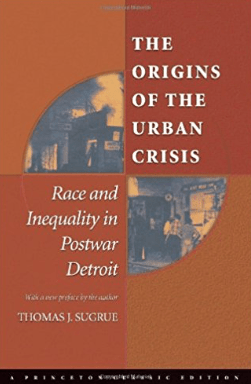 Once America’s “arsenal of democracy,” Detroit is now the symbol of the American urban crisis. In this reappraisal of America’s racial and economic inequalities, Thomas Sugrue asks why Detroit and other industrial cities have become the sites of persistent racialized poverty. He challenges the conventional wisdom that urban decline is the product of the social programs and racial fissures of the 1960s. Weaving together the history of workplaces, unions, civil rights groups, political organizations, and real estate agencies, Sugrue finds the roots of today’s urban poverty in a hidden history of racial violence, discrimination, and deindustrialization that reshaped the American urban landscape after World War II.
Once America’s “arsenal of democracy,” Detroit is now the symbol of the American urban crisis. In this reappraisal of America’s racial and economic inequalities, Thomas Sugrue asks why Detroit and other industrial cities have become the sites of persistent racialized poverty. He challenges the conventional wisdom that urban decline is the product of the social programs and racial fissures of the 1960s. Weaving together the history of workplaces, unions, civil rights groups, political organizations, and real estate agencies, Sugrue finds the roots of today’s urban poverty in a hidden history of racial violence, discrimination, and deindustrialization that reshaped the American urban landscape after World War II.
Detroit: An American Autopsy (2014)
by Charlie LeDuff
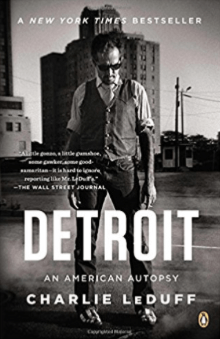 Back in his broken hometown, Pulitzer Prize-winning journalist Charlie LeDuff searches the ruins of Detroit for clues to his family’s troubled past. Having led us on the way up, Detroit now seems to be leading us on the way down. Once the richest city in America, Detroit is now the nation’s poorest. Once the vanguard of America’s machine age—mass-production, blue-collar jobs, and automobiles—Detroit is now America’s capital for unemployment, illiteracy, dropouts, and foreclosures. With the steel-eyed reportage that has become his trademark, and the righteous indignation only a native son possesses, LeDuff sets out to uncover what destroyed his city. He beats on the doors of union bosses and homeless squatters, powerful businessmen and struggling homeowners and the ordinary people holding the city together by sheer determination. Detroit: An American Autopsy is a New York Times Bestseller that weaves an unbelievable story of a hard town in a rough time filled with some of the strangest and strongest people our country has to offer.
Back in his broken hometown, Pulitzer Prize-winning journalist Charlie LeDuff searches the ruins of Detroit for clues to his family’s troubled past. Having led us on the way up, Detroit now seems to be leading us on the way down. Once the richest city in America, Detroit is now the nation’s poorest. Once the vanguard of America’s machine age—mass-production, blue-collar jobs, and automobiles—Detroit is now America’s capital for unemployment, illiteracy, dropouts, and foreclosures. With the steel-eyed reportage that has become his trademark, and the righteous indignation only a native son possesses, LeDuff sets out to uncover what destroyed his city. He beats on the doors of union bosses and homeless squatters, powerful businessmen and struggling homeowners and the ordinary people holding the city together by sheer determination. Detroit: An American Autopsy is a New York Times Bestseller that weaves an unbelievable story of a hard town in a rough time filled with some of the strangest and strongest people our country has to offer.
Once in a Great City: A Detroit Story (2016)
by David Maraniss
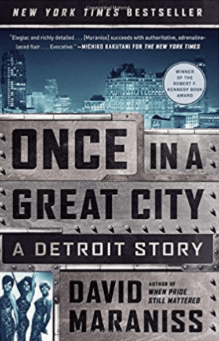 Detroit in 1963 is on top of the world. The city’s leaders are among the most visionary in America: Grandson of the first Ford; Henry Ford II; Motown’s founder Berry Gordy; the Reverend C.L. Franklin and his daughter, the incredible Aretha; Governor George Romney, Mormon and Civil Rights advocate; car salesman Lee Iacocca; Police Commissioner George Edwards; Martin Luther King. The time was full of promise. The auto industry was selling more cars than ever before. Yet the shadows of collapse were evident even then.
Detroit in 1963 is on top of the world. The city’s leaders are among the most visionary in America: Grandson of the first Ford; Henry Ford II; Motown’s founder Berry Gordy; the Reverend C.L. Franklin and his daughter, the incredible Aretha; Governor George Romney, Mormon and Civil Rights advocate; car salesman Lee Iacocca; Police Commissioner George Edwards; Martin Luther King. The time was full of promise. The auto industry was selling more cars than ever before. Yet the shadows of collapse were evident even then.
In this New York Times Bestseller, David Maraniss shows that before the devastating riot, before the decades of civic corruption and neglect, and white flight; before people trotted out the grab bag of rust belt infirmities and competition from abroad to explain Detroit’s collapse, one could see the signs of a city’s ruin. Detroit at its peak was threatened by its own design. It was being abandoned by the new world economy and by the transfer of American prosperity to the information and service industries. In 1963, as Maraniss captures it with power and affection, Detroit summed up America’s path to prosperity and jazz that was already past history.
Detroit: A Biography (2014) by Scott Martelle
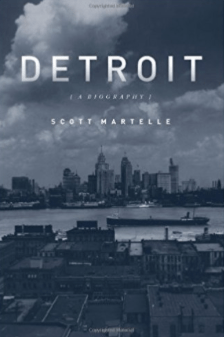 At its heyday in the 1950s and 1960s, Detroit’s status as epicenter of the American auto industry made it a vibrant, populous, commercial hub—and then the bottom fell out. Detroit: A Biography takes a long, unflinching look at the evolution of one of America’s great cities and one of the nation’s greatest urban failures. This authoritative yet accessible narrative seeks to explain how the city grew to become the heart of American industry and how its utter collapse—from nearly two million residents in 1950 to less than 715,000 some six decades later—resulted from a confluence of public policies, private industry decisions, and deeply ingrained racism. Drawing from U.S. Census data and including profiles of individuals who embody the recent struggles and hopes of the city, this book chronicles the evolution of what a modern city once was and what it has become.
At its heyday in the 1950s and 1960s, Detroit’s status as epicenter of the American auto industry made it a vibrant, populous, commercial hub—and then the bottom fell out. Detroit: A Biography takes a long, unflinching look at the evolution of one of America’s great cities and one of the nation’s greatest urban failures. This authoritative yet accessible narrative seeks to explain how the city grew to become the heart of American industry and how its utter collapse—from nearly two million residents in 1950 to less than 715,000 some six decades later—resulted from a confluence of public policies, private industry decisions, and deeply ingrained racism. Drawing from U.S. Census data and including profiles of individuals who embody the recent struggles and hopes of the city, this book chronicles the evolution of what a modern city once was and what it has become.
Heaven Was Detroit: From Jazz to Hip-Hop and Beyond (2016)
by M. L. Liebler, Editor
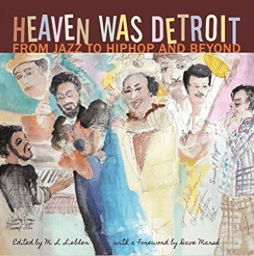 Heaven Was Detroit: From Jazz to Hip Hop and Beyond is the first of its kind to capture the full spectrum of Detroit popular music from the early 1900s to the twenty-first century. Readers will find in this unique and stimulating anthology new essays, and a few classics, by widely known and respected music writers, critics, and recording artists who weigh in on their careers and experiences in the Detroit music scene, from rock to jazz and everything in between. With a foreword by the acclaimed rock writer Dave Marsh and iconic photos by Leni Sinclair, the book features such well-known writers as Greil Marcus, Jaan Uhelszki, Al Young, Susan Whitall, Gary Graff, John Sinclair, and many others.
Heaven Was Detroit: From Jazz to Hip Hop and Beyond is the first of its kind to capture the full spectrum of Detroit popular music from the early 1900s to the twenty-first century. Readers will find in this unique and stimulating anthology new essays, and a few classics, by widely known and respected music writers, critics, and recording artists who weigh in on their careers and experiences in the Detroit music scene, from rock to jazz and everything in between. With a foreword by the acclaimed rock writer Dave Marsh and iconic photos by Leni Sinclair, the book features such well-known writers as Greil Marcus, Jaan Uhelszki, Al Young, Susan Whitall, Gary Graff, John Sinclair, and many others.
Divided into nine sections, the book moves chronologically through the early days of jazz in Detroit, to the rock ‘n’ roll of the 1960s, and up to today’s electronica scene, with so many groundbreaking moments in between. This collection of cohesive essays includes Motown’s connection to the Civil Rights Movement and the Black Power Movement through its side label, Black Forum Records; Lester Bangs’s exemplary piece on Alice Cooper; the story behind the emergence of rap legend Eminem; and Craig Maki’s enlightening history on “hillbilly rock” – just to name a few. With a rich musical tradition to rival Nashville, Detroit serves as the inspiration, backdrop, and playground for some of the most influential music artists of the past century.
Heaven Was Detroit captures the essence of the Detroit music scene: the grit, the spark, the desire to tell a story set to the rhythm of the city. Fans of any music genre will find something that speaks to them in the pages of this collection.
Detroit City Is the Place to Be: The Afterlife of an American Metropolis (2013) by Mark Binelli
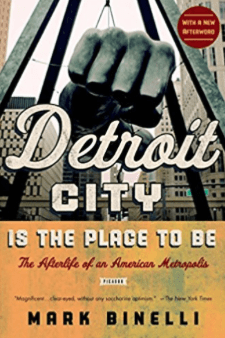 Once America’s capitalist dream town, Detroit is our country’s greatest urban failure, having fallen the longest and the farthest―and, finally, into the largest municipal bankruptcy in U.S. history. But the city’s worst crisis yet (and that’s saying something) has managed to do the unthinkable: turn the end of days into a laboratory for the future. Urban planners, land speculators, neopastoral agriculturalists, and utopian environmentalists―all have been drawn to Detroit’s baroquely decaying, nothing-left-to-lose frontier.
Once America’s capitalist dream town, Detroit is our country’s greatest urban failure, having fallen the longest and the farthest―and, finally, into the largest municipal bankruptcy in U.S. history. But the city’s worst crisis yet (and that’s saying something) has managed to do the unthinkable: turn the end of days into a laboratory for the future. Urban planners, land speculators, neopastoral agriculturalists, and utopian environmentalists―all have been drawn to Detroit’s baroquely decaying, nothing-left-to-lose frontier.
With an eye for both the darkly absurd and the radically new, Detroit-area native Mark Binelli has chronicled this convergence. One of Publishers Weekly‘s Top 10 Best Books of 2012, Detroit City Is the Place to Be is alive with the sense of possibility that comes when a city hits rock bottom. Binelli does not shy away from exploring the violence, economic devastation, political corruption, and physical ruin that have ravaged his hometown, but he also offers a glimpse of a long-shot future Detroit that is smaller, less segregated, greener, economically diverse, and better functioning―what could be the boldest reimagining of a postindustrial city in our new century.
Black Detroit: A People’s History of Self-Determination (2017) by Herb Boyd
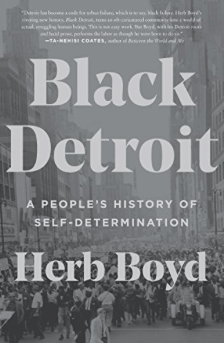 Boyd reveals how Black Detroiters were prominent in the city’s historic, groundbreaking union movement and—when given an opportunity—were among the tireless workers who made the automobile industry the center of American industry. Well paying jobs on assembly lines allowed working class Black Detroiters to ascend to the middle class and achieve financial stability, an accomplishment not often attainable in other industries. With a stunning eye for detail and passion for Detroit, Boyd celebrates the music, manufacturing, politics, and culture that make it an American original.
Boyd reveals how Black Detroiters were prominent in the city’s historic, groundbreaking union movement and—when given an opportunity—were among the tireless workers who made the automobile industry the center of American industry. Well paying jobs on assembly lines allowed working class Black Detroiters to ascend to the middle class and achieve financial stability, an accomplishment not often attainable in other industries. With a stunning eye for detail and passion for Detroit, Boyd celebrates the music, manufacturing, politics, and culture that make it an American original.
How to Kill a City: Gentrification, Inequality, and the Fight for the Neighborhood (2017)
by Peter Moskowitz
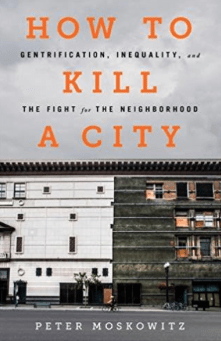 Peter Moskowitz’s How to Kill a City takes readers from the kitchen tables of hurting families who can no longer afford their homes to the corporate boardrooms and political backrooms where destructive housing policies are devised. Along the way, Moskowitz uncovers the massive, systemic forces behind gentrification in New Orleans, Detroit, San Francisco, and New York. The deceptively simple question of who can and cannot afford to pay the rent goes to the heart of America’s crises of race and inequality. In the fight for economic opportunity and racial justice, nothing could be more important than housing.
Peter Moskowitz’s How to Kill a City takes readers from the kitchen tables of hurting families who can no longer afford their homes to the corporate boardrooms and political backrooms where destructive housing policies are devised. Along the way, Moskowitz uncovers the massive, systemic forces behind gentrification in New Orleans, Detroit, San Francisco, and New York. The deceptively simple question of who can and cannot afford to pay the rent goes to the heart of America’s crises of race and inequality. In the fight for economic opportunity and racial justice, nothing could be more important than housing.
Terror in the City of Champions: Murder, Baseball, and the Secret Society that Shocked Depression-era Detroit (2017)
by Tom Stanton
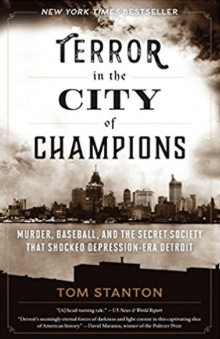 Now in paperback comes the critically acclaimed New York Times Bestseller about a championship city haunted by a wave of racist terror. Detroit, mid-1930s was abuzz over its unrivaled sports success when gun-loving baseball fan Dayton Dean became ensnared in the nefarious Black Legion. The secretive, Klan-like group murdered enemies, flogged associates, and planned armed rebellion. The Legion boasted tens of thousands of members across the Midwest, among them politicians and prominent citizens—even, possibly, a beloved athlete. Award-winning author Tom Stanton has written a stunning tale of history, crime, and sports.
Now in paperback comes the critically acclaimed New York Times Bestseller about a championship city haunted by a wave of racist terror. Detroit, mid-1930s was abuzz over its unrivaled sports success when gun-loving baseball fan Dayton Dean became ensnared in the nefarious Black Legion. The secretive, Klan-like group murdered enemies, flogged associates, and planned armed rebellion. The Legion boasted tens of thousands of members across the Midwest, among them politicians and prominent citizens—even, possibly, a beloved athlete. Award-winning author Tom Stanton has written a stunning tale of history, crime, and sports.
Detroit ’67 (2014) by Dominique Morisseau
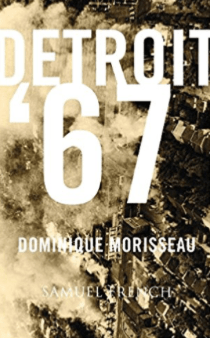 Dominique Morisseau, a rising star of the playwriting world and recipient of the 2014 Edward M. Kennedy Prize for Drama Inspired by American History takes the audience on a journey to 1967, in the city of Detroit. Motown music is getting the party started, and Chelle and her brother Lank are making ends meet by turning their basement into an after-hours joint. But when a mysterious woman finds her way into their lives, the siblings clash over much more than the family business. As their pent-up feelings erupt, so does their city, and they find themselves caught in the middle of the ’67 riots. Following an acclaimed run at The Public Theater in association with the Classical Theatre of Harlem and the National Black Theatre, Detroit ’67 explores a moment in history that exploded racial tensions and perception in America. Morisseau will be releasing a dramatized collection based on Detroit ‘67 in October 2017 called The Detroit Project: Three Plays.
Dominique Morisseau, a rising star of the playwriting world and recipient of the 2014 Edward M. Kennedy Prize for Drama Inspired by American History takes the audience on a journey to 1967, in the city of Detroit. Motown music is getting the party started, and Chelle and her brother Lank are making ends meet by turning their basement into an after-hours joint. But when a mysterious woman finds her way into their lives, the siblings clash over much more than the family business. As their pent-up feelings erupt, so does their city, and they find themselves caught in the middle of the ’67 riots. Following an acclaimed run at The Public Theater in association with the Classical Theatre of Harlem and the National Black Theatre, Detroit ’67 explores a moment in history that exploded racial tensions and perception in America. Morisseau will be releasing a dramatized collection based on Detroit ‘67 in October 2017 called The Detroit Project: Three Plays.
Full descriptions are available on Amazon for each book listed.



